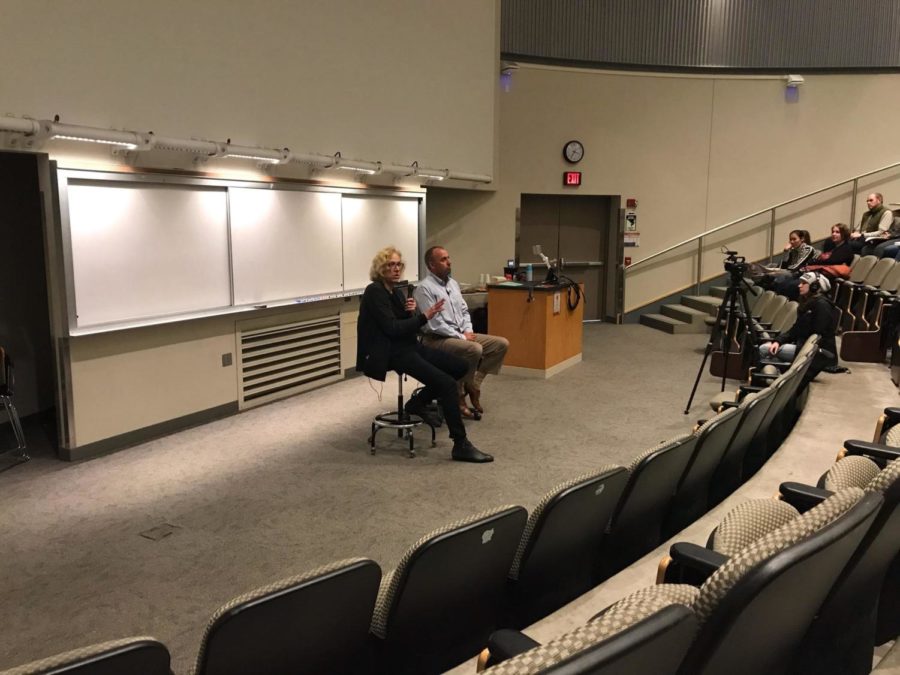Iowa’s agriculture in need of improvement
Amber Friedrichsen/ Iowa State Daily
Jeremy Jackson (left), professor at Scripps Institution of Oceanography, and Seth Watkins (right), a fourth generation farmer at Pinhook Farms, presenting the “Can Iowa Agriculture Survive” lecture.
October 30, 2019
Two speakers with two different perspectives on sustainability discussed the present and future of Iowa’s agriculture at the lecture “Can Iowa Agriculture Survive” Wednesday.
Seth Watkins, a fourth generation farmer of the Pinhook Farms cow-calf and crop operation from Clarinda, Iowa, and Jeremy Jackson, a professor at Scripps Institution of Oceanography in La Jolla, California, examined the pros and cons of Iowa’s farming practices.
Watkins addressed issues that currently face farmers in the state of Iowa. Watkins said these issues come from not using resources effectively to carry out agricultural responsibilities, like growing crops.
“I personally believe we are dealing with a failing and broken food system and agriculture plays a big part in that,” Watkins said. “Why are we destroying the very resources we need most to raise a crop?”
One of the resources heavily scrutinized was water. The way farming practices contaminate water is what Jackson said interested him in coming to Iowa. He said he wanted to figure out what was making waters in the Gulf of Mexico toxic.
“I first came here because I was interested in the dead zone in the Gulf of Mexico,” Jackson said. “And I knew it was driven by agriculture in the corn belt.”
This harm to water can be traced back to the harsh chemicals farmers use to produce their crops. Jackson said he was unhappy with how farmers were willing to put not only the environment but also people in danger.
“I’m going to evolve the question and say how do Iowa farmers sleep at night knowing they are endangering the health of their neighbors and their families?” Jackson said.
Watkins said he agreed with the idea farming is misusing resources and is weakening the environment.
“One of the frustrations we have to be able to see these things clearly when we feel like they are totally out of our control,” Watkins said. “The other thing that is equally scary is recognizing again that [Iowa’s] got incredible soil, we’ve got these great, bright people in our state […] but we are not using our resources properly.”
Watkins has implemented conservation practices on his farm, such as no-till, planting a cover crop and utilizing crop rotation. He said he thinks agriculture has the possibility to get better.
“I think when you really are trying to improve a system, like all of us are, you take a long hard look at what we are really doing — an objective look — and a lot of good can come out of that,” Watkins said.
Despite previous reluctance, Jackson said he began to support this idea of improvement as well.
“You have this incredible opportunity,” Jackson said. “View these things not as fighting regulation, but as opportunities to be more successful and do a little good while you do it.”
Some audience members, like Vivian Cook, a graduate student in community and regional planning, said they were inspired after the two men spoke.
“I hope Iowa agriculture gets to a point where environmental and social sustainability are just as important as economical sustainability in a way that values the lifestyle of everyone that depends on agriculture, which is everyone,” Cook said.
Having two people with different backgrounds such as Watkins and Jackson to speak on behalf of Iowa’s agriculture, may be a way for people to encompass multiple perspectives.
“I think the biggest thing that I got from the talk was their perspectives that were different on an issue,” Cook said. “I think [agriculture] has a lot more power than we give it credit for.”
This “power” is something that Watkins said he believes in. He called farming a legacy and said he sees it as something present and future farmers are responsible for taking care of.
”This is our legacy and it’s our choice on how we deal with this,” Watkins said. “We have the technology, we know what we are getting into. It really falls on us.”







